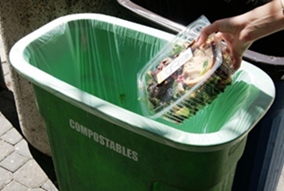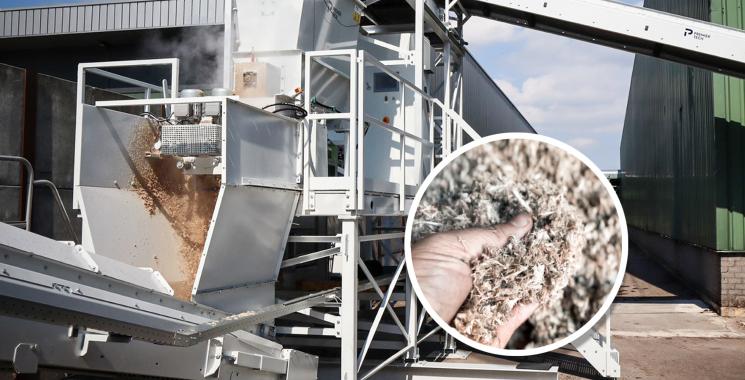AORA Partner News - BASF compostable polymer ecovio receives Australian certification

Compostable plastics currently only account for around 0.1% of plastic packaging on the market in Australia amidst growing interest from both consumers and our customers. As the interest in sustainable packaging grows, so does the confusion about how to dispose of it – a topic that the Australian Packaging Covenant Organisation (APCO), the Australasian Bioplastics Association (ABA) and the Australian Organics Recycling Association (AORA) have come together to tackle through the development of new Australian guidelines to help businesses make better choices about using compostable packaging.
In preparation for the arrival of the new guidelines, BASF Australia has now completed the verification of their compostable and partly biobased bioplastic, ecovio®, as meeting all of the requirements of the Australian Standards, AS 4736 and AS 5810. These Standards respectively cover the suitability of compostable products for commercial or industrial composting and home composting.
Rowan Williams, Regional Market Development Manager, Asia Pacific - Biopolymers ecoflex® & ecovio (who is also the President of the ABA - the peak Industry body for the appropriate use of bioplastics in ANZ) closely advised on the new guidelines and joined a panel at the virtual industry launch held on May 6, 2020. BASF is also a founding and platinum plus sponsor member of AORA - the peak Industry body for the recycled organics industry.
In 2018, Australia established the 2025 National Packaging Targets to create a new sustainable pathway for the way we manage packaging in Australia. “One of the four key targets to be achieved by 2025, is, 100% reusable, recyclable or compostable packaging,” explained Rowan. “In order to achieve this and other targets, the Australian Packaging Covenant Organisation works with brand owners and industry stakeholders. These new guidelines will play an important role as they look up and down the value chain, at where the raw material, like ecovio comes from and also where the finished packaging will go to, such as organics recycling, in the future,” he added.
Based on the systems and infrastructure currently available, the guideline identifies the key potential applications and opportunities for certified compostable plastic packaging, with a strong emphasis on packaging that could also facilitate the collection of food waste. These include food scraps liners, fruit and vegetable stickers and ‘closed-loop’ situations, such as festivals.
Recommendations are provided about how to correctly communicate with end consumers, including accurate certification and correct language for labelling and marketing. Statements to avoid are also highlighted, including the misleading terminology and greenwashing claims that are currently contributing to unintentional litter and contamination of the mechanical recycling system.
What will the new certifications mean for BASF and our customers?
For BASF the new certifications provide an important tool to help educate the industry and consumers to understand how they should correctly dispose of compostable packaging.
“The main source of confusion that exists around compostable packaging is how to dispose of it. Most people assume that if they dispose of it in the normal green waste stream it will be composted, but that’s incorrect – most times it will end up in landfill as considered a contaminant in that stream” explains Rowan.
Landfilling of organic matter is environmentally detrimental as it generates methane, a greenhouse gas 32 times more potent than carbon dioxide. As food or organic waste has high water content, incineration is also not suitable as it requires significant amounts of energy and results in higher carbon dioxide emissions.
“To achieve the best environmental end of life outcome of a product made with ecovio it needs to end up in a commercial composting system or a household compost bin,” Rowan said. “If it’s suitable for commercial composting, it will carry that particular “seedling logo”, or if suitable for home composting, that particular “home composting” logo. Both logos are licensed from the ABA after successful verification of compliance to the Australian Standards.
With many Australian councils now implementing measures to better source separate household waste and collect same, in programs such as FOGO, (Food Organics Garden Organics), consumer interest and education will increase, so it’s important the industry works together on initiatives such as this to support education on waste streams.
“As awareness grows, people will reuse more where they can and things that can be recycled should and will be recycled. Certified compostable products will also be an alternative, but it’s important to note that it isn’t a silver bullet. It will be there in manageable volumes and play an important role in reducing food waste or food contaminated conventional plastic waste, however it isn’t a suitable alternative for all packaging,” Rowan added.
About BASF in Australia and New Zealand
BASF serves key industries in the agriculture, coatings, construction, manufacturing and mining sectors, and posted sales of about €359 million in Australia and New Zealand in 2019. As of the end of 2019, the company had 500 employees and operated 11 production sites across agricultural solutions, performance products and functional materials and solutions. BASF has been active in Australia for more than 90 years, and for about 60 years in New Zealand. Further information is available on the internet at www.basf.com/au.
About BASF
At BASF, we create chemistry for a sustainable future. We combine economic success with environmental protection and social responsibility. More than 117,000 employees in the BASF Group work on contributing to the success of our customers in nearly all sectors and almost every country in the world. Our portfolio is organized into six segments: Chemicals, Materials, Industrial Solutions, Surface Technologies, Nutrition & Care and Agricultural Solutions. BASF generated sales of €59 billion in 2019. BASF shares are traded on the stock exchange in Frankfurt (BAS) and as American Depositary Receipts (BASFY) in the U.S. Further information at www.basf.com.
